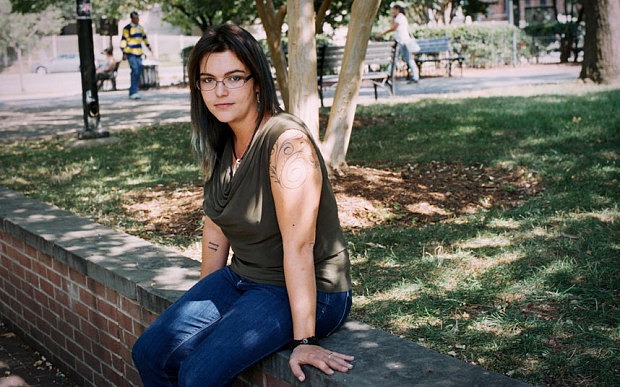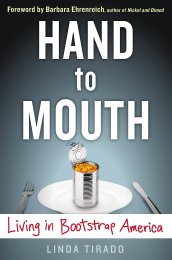Germany, 1918: “A scraggly band of child rebels, we met secretly in attics … We were taught by men who claimed they were deserters from the navy to hate the rich, to tell the poor they must rise in a body and fight …”
U.S.A., 2014: “I know a lot of people think that I’m supposed to be a good little worker bee and do my part to help move the wheels of capitalism. I just don’t see what’s in it for me anymore beyond my little paycheck. Think of it this way: At my earning peak, I made approximately nineteen cents a minute before taxes.”
The German writer did rise up. in his memoir, Out of the Night, Jan Valtin wrote of becoming a Communist fighter, agent and organizer—although that went sour, and he died in the United States, presumably doing his part to turn capitalism’s wheels.
As for the American writer, whose new book is the subject of this review, I suppose the jury is still out—but although she serves up plenty of fighting words, the 1 percent need not hire extra bodyguards on her account:
If you feel that something must be done before the villagers find their pitchforks, here is what you can do: Stop being a dick to service workers whenever possible. Start filling out those stupid surveys when someone’s done their job well …
Linda Tirado is a credible, passionate and sometimes powerful expresser of the poverty she describes. Her mouth was injured in an automobile accident; her teeth went on decaying because she had to choose between fixing them and getting a new car, which she needed to get to work.
I have an answer to this poor person’s question. The rest of the country will manage just fine, because it never cared about you and never will.
When she and her husband moved from Ohio, where they were receiving food stamps, to Utah, where they needed to apply for them, and then Ohio in spite of being informed that the move would not take them off its own distribution list, they got written up for welfare fraud. “For years my diet consisted of whatever food at work had become expired for service most recently.”
It is these ghastly details which make her book an important primary source on our epoch’s particular forms of class exploitation. Let me quote from one of the most powerful passages:
I earn my wages with my scars … I’ve burned my hands because the oven gloves had worn through and the owners were too cheap to spring for another pair. I’ve sliced my fingers open nearly to the bone when the knives have slipped. I’ve dropped heavy equipment on my feet because it was so busy I didn’t have time to wash the grease off my hands. I’ve hurt myself in more ways than I can count because that was how I got my seven or eight bucks an hour.
The following is sadder still:
I’m not preparing our kids for a gentle world, full of interesting and stimulating experiences. I’m getting them ready to keep their damn mouths shut while some idiot tells them what to do.
Hand to Mouth: Living in Bootstrap America is less a memoir or exposition than a polemic against the sickeningly cruel and hypocritical tirades of self-reliant Americanism uttered by the rich against the poor. As such, its bitterness is all too appropriate.
I get that poor people’s coping mechanisms aren’t cute. Really I do. But what I don’t get is why other people feel so free in judging us for them. As if our self-destructive behaviors therefore justify and explain our crappy lives.
Tirado has a gift for stating the obvious, and I mean that as a compliment, because the 1 percenters who demonize the poor have always followed Hitler’s strategy of the big lie: the bigger the lie, the more it will be believed.
“So let’s break this down,” Tirado explains. “You’re poor, so you desperately need whatever crappy job you can find, and the nature of that crappy job is that you can be fired anytime.”
And she keeps right on breaking it down, dissecting the big lie into its various poisonous slurs.
“But still we’re told to keep smiling, and to be grateful for the chance to barely survive while being blamed for not succeeding.” “It’s not like criminal behavior as we think of it has suddenly skyrocketed. We’ve just made more shit illegal.” “You cannot cut access to birth control and then act surprised when people get pregnant.” “It is impossible to be good with money when you don’t have any.” “I have trouble understanding why taking a few grand a year in food stamps is somehow magically different than taking trillions as a bailout.”
What could be more evident, more true?
And what could prove the value of her voice any better than the fact that America is somehow surprised by it?
Of course, after her little surprise, America will go back to sleep. “The question is, how can the rest of the country live knowing that so many of us have to live like this?”
I have an answer to this poor person’s question. The rest of the country will manage just fine, because it never cared about you and never will.
Not quite 14 decades ago, while we were mopping up the Plains Indians, President Rutherford B. Hayes wrote:
Now the great problem is to rid our country of the conflict between wealth and poverty without destroying either society or civilization, or liberty & free government.
I suspect that 14 decades from now, assuming that this planet still supports human life, the same great problem will remain. Well, what to do about it? Should the poor “rise in a body and fight,” or, as Tirado has done, shut out everything beyond their own little paychecks? “Stop being a dick to service workers whenever possible.”
Do you really call that an answer?
In fact, Tirado does make policy recommendations every now and then, but they approach tautology:
I have a solution to hungry children in America … Fucking feed people. Cancel the programs where we pay farmers not to farm, and grow food … Stop calling it welfare and start calling it something that describes what it is: a subsidy like any other so that the people actually moving this huge wheel of capitalism can live decent, maybe basic but still pleasant lives. Hunger: solved.
Well, obviously the solution to hunger is to feed people, which should be simple to accomplish—but isn’t. The absurd obstacles challenging that feeble mite of legislative do-gooding called “Obamacare” are proof of that. Feed people? Could that be socialism? It might or might not be; most Americans will probably say it is. That sure ought to prevent it!
What would Linda Tirado call it? She seems pretty attached to her wheel of capitalism (now mysteriously reduced from the wheels of capitalism it was before; just what is it?). I would ask her this: Could capitalism itself be your problem? In any event, are you prepared to stand up and demand something practical for all poor people? And if others take up your demands, will you be there with them?
These questions assert themselves with some insistence in my mind, because—understandably and perhaps inevitably—Tirado’s privations, frustrations and exhaustions have contracted her horizons:
It’s not that I don’t care about global warming or the environment; it’s that there’s only so far out of my way I’m willing to go … Overconsumption is a concern for people who’ve made it to regular consumption … I do not care about the whales … Once we’ve hit the part where my own species is mostly taken care of, I’ll start to worry about African rhinos. Until then, I’ll just keep restraining myself from punching people when they look me in the face and argue that an ecosystem somewhere is more important than homelessness.
The notion that she would be going out of her way to engage with “the environment” is asinine. No matter how deprived she is, she cannot help but take part, even involuntarily, in overconsumption—of the plastic wraps and packaging on the expired foods to which she resorts, of the fossil fuels in her junky gas-guzzler cars and badly insulated crapball apartments, of the shoddy goods that her service-industry jobs help to peddle.
The extinctions of whales and African rhinos may not affect her, and that’s lovely for her—but “an ecosystem somewhere” happens to be this one here, and if it collapses, her children will be worse off than she is.
Do I blame her for not concerning herself with our collective prospect of slow-motion doom? No; how could I? She certainly has more imminent worries. But when she speaks of punching people who advocate for “an ecosystem somewhere,” I’m simply repulsed.
I would not have gone on so long about this if she hadn’t. Her accounts of the suffering she has experienced are far more affecting than her monotonously repetitive hectoring tone.
If she had stopped at the very honest and explicable “I just don’t see what’s in it for me anymore beyond my little paycheck,” I would have liked the book more.
As it is, I still admire it, and her.
William T. Vollmann is the author of many books, including Rising Up and Rising Down: Some Thoughts on Violence and Poor People. His latest is a collection of fiction entitled Last Stories and Other Stories.








0 Comments